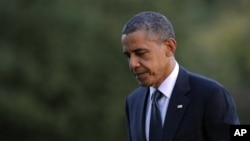WHITE HOUSE —
With the death toll in Syria's civil war now at 93,000 by United Nations estimates, the White House says President Obama continues to "closely" evaluate options available to him.
While the president and White House officials continue to stress that all options on Syria are being weighed carefully, Obama has never ruled out military force of some kind, whether unilateral or multilateral, but he has said he does not envision sending U.S. ground troops into Syria.
All this week, the White House has said little publicly about media reports of high-level meetings or reports quoting officials saying a decision on providing weapons to Syrian rebels was near.
Related video report by Meredith Buel Spokesman Jay Carney, who describes Obama as "greatly concerned" by the "terrible [and] worsening" situation in Syria, says only that meetings are "constantly" under way.
Carney said the president Obama is "very closely" reviewing and considering what other options are available to the U.S., allies and partners.
"Every option that he considers he evaluates, and his team evaluates, based on the long-term view of whether or not implementation of a new policy option will actually bring about the desired result, as opposed to seeming like a good thing to do but not actually changing the situation, or improving the situation and perhaps worsening it instead," Carney said.
Reporters pressed Carney about remarks purportedly made by former Democratic president Bill Clinton during a Capitol Hill event with Republican Senator John McCain.
Citing a recording of the event, which was closed to media, Politico reported that the former president said he agrees with McCain, a sharp critic of Obama, on the need for stronger U.S. action in Syria, and that failure to intervene would be a "big mistake."
According to the Politico report, Clinton also contrasted Obama policy on Syria with his decision to intervene in Kosovo, saying a president must look beyond public and congressional reluctance and set aside public opinion polls.
Carney said Obama is "very aware of past precedent" and welcomes a range of input from anyone in and outside of government, but added that Obama is carefully assessing options.
"Having not seen the full extent of President Clinton's remarks, I think that those are all valid points," said Carney. "Having said that, President Obama assesses this specific situation, which can be analogous, but not perfectly so, to the past and judges what is in best interests of the United States today, and what policy options present the best opportunity for achieving our ultimate goal."
In his remarks, former president Clinton was also quoted as referring to gains by the regime of Syrian President Bashar al-Assad, with help from Russia, Iran and Hezbollah.
White House press secretary Carney said planning for a possible Syria peace conference continues, and that Syria will be a topic of conversation at the upcoming G8 Summit in Northern Ireland.
While the president and White House officials continue to stress that all options on Syria are being weighed carefully, Obama has never ruled out military force of some kind, whether unilateral or multilateral, but he has said he does not envision sending U.S. ground troops into Syria.
All this week, the White House has said little publicly about media reports of high-level meetings or reports quoting officials saying a decision on providing weapons to Syrian rebels was near.
Related video report by Meredith Buel Spokesman Jay Carney, who describes Obama as "greatly concerned" by the "terrible [and] worsening" situation in Syria, says only that meetings are "constantly" under way.
Carney said the president Obama is "very closely" reviewing and considering what other options are available to the U.S., allies and partners.
"Every option that he considers he evaluates, and his team evaluates, based on the long-term view of whether or not implementation of a new policy option will actually bring about the desired result, as opposed to seeming like a good thing to do but not actually changing the situation, or improving the situation and perhaps worsening it instead," Carney said.
Reporters pressed Carney about remarks purportedly made by former Democratic president Bill Clinton during a Capitol Hill event with Republican Senator John McCain.
Citing a recording of the event, which was closed to media, Politico reported that the former president said he agrees with McCain, a sharp critic of Obama, on the need for stronger U.S. action in Syria, and that failure to intervene would be a "big mistake."
According to the Politico report, Clinton also contrasted Obama policy on Syria with his decision to intervene in Kosovo, saying a president must look beyond public and congressional reluctance and set aside public opinion polls.
Carney said Obama is "very aware of past precedent" and welcomes a range of input from anyone in and outside of government, but added that Obama is carefully assessing options.
"Having not seen the full extent of President Clinton's remarks, I think that those are all valid points," said Carney. "Having said that, President Obama assesses this specific situation, which can be analogous, but not perfectly so, to the past and judges what is in best interests of the United States today, and what policy options present the best opportunity for achieving our ultimate goal."
In his remarks, former president Clinton was also quoted as referring to gains by the regime of Syrian President Bashar al-Assad, with help from Russia, Iran and Hezbollah.
White House press secretary Carney said planning for a possible Syria peace conference continues, and that Syria will be a topic of conversation at the upcoming G8 Summit in Northern Ireland.







